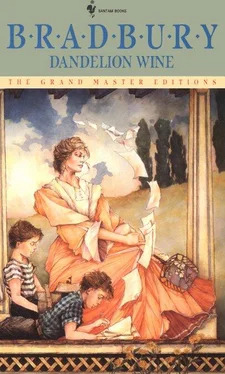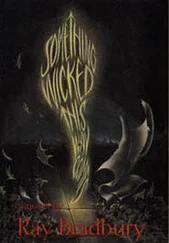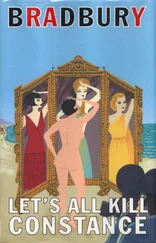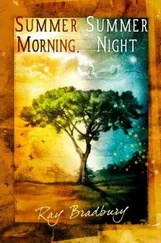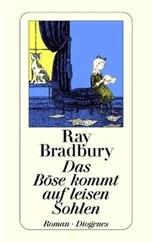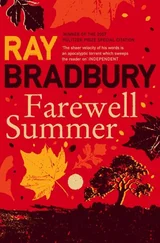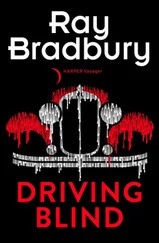“You remember winning, don’t you? A battle won, somewhere?”
“No,” said the old man, deep under. “I don’t remember anyone winning anywhere any time. War’s never a winning thing, Charlie. You just lose all the time, and the one who loses last asks for terms. All I remember is a lot of losing and sadness and nothing good but the end of it. The end of it, Charles, that was a winning all to itself, having nothing to do with guns. But I don’t suppose that’s the kind of victory you boys mean for me to talk on.”
“Antietam,” said John Huff. “Ask about Antietam.”
“I was there.”
The boys’ eyes grew bright. “Bull Run, ask him Bull Run . . .”
“I was there.” Softly.
“What about Shiloh?”
“There’s never been a year in my life I haven’t thought, what a lovely name and what a shame to see it only on battle records.”
“Shiloh, then. Fort Sumter?”
“I saw the first puffs of powder smoke.” A dreaming voice. “So many things come back, oh, so many things. T remember songs. ‘AU’s quiet along the Potomac tonight, where the soldiers lie peacefully dreaming; their tents in the rays of the clear autumn moon, or the light of the watchfire, are gleaming. Remember, remember . . . ‘AU quiet along the Potomac tonight; no sound save the rush of the river; while soft falls the dew on the face of the dead—the picket’s off duty forever!’ . . . After the surrender, Mr. Lincoln, on the White House balcony asked the band to play, ‘Look away, look away, look away, Dixie land.’ . . . And then there was the Boston lady who one night wrote a song will last a thousand years: ‘Mine eyes have seen the glory of the coming of the Lord; He is trampling out the vintage where the grapes of wrath are stored. Late nights I feel my mouth move singing back in another time. ‘Ye Cavaliers of Dixie! Who guard the Southern shores . . .’ ‘When the boys come home in triumph, brother, with the laurels they shall gain . . .’ So many songs, sung on both sides, blowing north, blowing south on the night winds. ‘We are coming, Father Abraham, three hundred thousand more . . .’ ‘Tenting tonight, tenting tonight, tenting on the old camp ground.’ ‘Hurrah, hurrah, we bring the Jubilee, hurrah, hurrah, the flag that makes us free . . .”
The old man’s voice faded.
The boys sat for a long while without moving. Then Charlie turned and looked at Douglas and said, “Well, is he or isn’t he?” Douglas breathed twice and said, “He sure is.”
The colonel opened his eyes.
“I sure am what?” he asked.
“A Time Machine,” murmured Douglas. “A Time Machine.”
The colonel looked at the boys for a full five seconds. Now it was his voice that was full of awe.
“Is that what you boys call me?” “Yes, sir, Colonel.”
“Yes, sir.”
The colonel sat slowly back in his chair and looked at the boys and looked at his hands and then looked at the blank wall beyond them steadily.
Charlie arose. “Well, I guess we better go. So long and thanks, Colonel.”
“What? Oh, so long, boys.”
Douglas and John and Charlie went on tiptoe out the door.
Colonel Freeleigh, though they crossed his line of vision, did not see them go.
In the street, the boys were startled when someone shouted from a first-floor window above, “Hey!”
They looked up.
“Yes, sir, Colonel?”
The colonel leaned out, waving one arm.
“I thought about what you said, boys!”
“Yes, sir?”
“And-you’re right! Why didn’t I think of it before! A Time Machine, by God, a Time Machine!”
“Yes, sir.”
“So long, boys. Come aboard any time!”
At the end of the street they turned again and the colonel was still waving. They waved back, feeling warm and good, then went on.
“Chug-a-chug,” said John. “I can travel twelve years into the past. Wham-chug-ding!”
“Yeah,” said Charlie, looking back at that quiet house, “but you can’t go a hundred years.”
“No,” mused John, “I can’t go a hundred years. That’s really traveling. That’s really some machine.”
They walked for a full minute in silence, looking at their feet. They came to a fence.
“Last one over this fence,” said Douglas, “is a girl.”
All the way home they called Douglas “Dora.”
Long after midnight Tom woke to find Douglas scribbling rapidly in the nickel tablet, by flashlight.
“Doug, what’s up?”
“Up? Everything’s up! I’m counting my blessings, Tom! Look here; the Happiness Machine didn’t work out, did it?. But, who cares! I got the whole year lined up, anyway. Need r to run anywhere on the main streets, I got the Green Town Trolley to look around and spy on the world from. Need to run anywhere off the main streets, I knock on Miss Fern and I Miss Roberta’s door and they charge up the batteries on their electric runabout and we go sailing down the sidewalks. Need to run down alleys and over fences, to see that part of Green Town you only see around back and behind and creep up on, and I got my brand-new sneakers. Sneakers, runabout, I trolley! I’m set! But even better, Tom, even better, listen! If I want to go where no one else can go because they’re not: smart enough to even think of it, if I want to charge back to 1890 and then transfer to 1875 and transfer again crosstown to 1860 I just hop on the old Colonel Freeleigh Express! I’m writing it down here this way: ‘Maybe old people were never children, like we claim with Mrs. Bentley, but, big or little, some of them were standing around at Appomattox the summer of 1865.’ They got Indian vision and can sight back further than you and me will ever sight ahead.”
“That sounds swell, Doug; what does it mean?”
Douglas went on writing. “It means you and me ain’t got half the chance to be far-travelers they have. If we’re lucky we’ll hit forty, forty-five, fifty, That’s just a jog around the block to them. It’s when you hit ninety, ninety-five, a hundred, that you’re far-traveling like heck.”
The flashlight went out.
They lay there in the moonlight.
“Tom,” whispered Douglas. “I got to travel all those ways. See what I can see. But most of all I got to visit Colonel Freeleigh once, twice, three times a week. He’s better than all the other machines. He talks, you listen. And the more he talks the more he gets you to peering around and noticing things. He tells you you’re riding on a very special train, by gosh, and sure enough, it’s hue. He’s been down the track, and knows. And now here we come, you and me, along the same track, but further on, and so much looking and snuffing and handling things to do, you need old Colonel Freeleigh to shove and say look alive so you remember every second! Every darn thing there is to remember! So when kids come around when you’re real old, you can do for them what the colonel once did for you. That’s the way it is, Tom, I got to spend a lot of time visiting him and listening so I can go far-traveling with him as often as he can.”
Tom was silent a moment. Then he looked over at Douglas there in the dark.
“Far-traveling. You make that up?”
“Maybe yes and maybe no.” “Far-traveling-” whispered Tom.
“Only one thing I’m sure of,” said Douglas, closing his eyes. “It sure sounds lonely.”
Bang!
A door slammed. In an attic dust jumped off bureaus and bookcases. Two old women collapsed against the attic door, each scrabbling to lock it tight, tight. A thousand pigeons seemed to have leaped off the roof right over their heads. They bent as if burdened, ducked under the drum of beating wings. Then they stopped, their mouths surprised. What they heard was only the pure sound of panic, their hearts in their chests . . . Above the uproar, they tried to make themselves heard. “What’ve we done! Poor Mister Quartermain!”
Читать дальше
